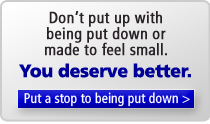The Real Secret to Consistent Confidence
 Tina was a client who told me how she’d given a great presentation once, but has bottled it every time since then
Tina was a client who told me how she’d given a great presentation once, but has bottled it every time since then
Rob mentioned to me that he’d bungee jumped once when he was travelling around Australia, but has held himself back from leaping into the abyss ever since.
Ella explained to me how she once opened up emotionally to her partner and revealed a vulnerability, but has since built those walls up again and doesn’t know how to talk openly.
One of the first things I ask a new client is “Tell me something you’ve done that took confidence”, and I’ve given you just 3 examples from a couple of hundred.
Giving a great presentation once doesn’t mean you’re a great presenter – you just gave a great presentation once. Going bungee jumping once doesn’t mean you’re always ready to leap – you just let gravity do its thing once. And opening up emotionally doesn’t mean you’re an open, emotionally intelligent person – you just let the moment take you once.
Confidence is being able to trust your behaviour with implicit trust in that behaviour, and that’s not a one-time thing. That’s why I always ask that question, because I know it makes 2 things abundantly clear.
Confidence is always there.
It’s easy to be confident when you’re feeling confident, just as Tina, Rob and Ella found. You could say that the 3 of them had a distinct lack of feeling not-confident; they found themselves in a place where there was no un-confidence; the one thing that was absent from each of their experiences was a loss of confidence. See what I’m getting at?
Your confidence never goes away. It diminishes the more you ignore it or when you forget it, but it’s always there waiting for you to use it. More and more I’m seeing confidence as your natural state. It’s how you are when all the crap that gets in the way of you feeling confident is removed.
That’s my favourite thing about confidence – it’s like the very best friend you never had. You can bad-mouth it, disparage it, ignore it and even punch it square in the jaw, and it will always be there, willing to help you.
Watching a client as they discover that THEIR confidence is right there, waiting for them, is simply awesome.
Confidence is applied at the point of change
Confidence has to be applied at the point of change – the point that tips what happens next one way or the other – and it needs to be applied consistently.
The point of change is that moment in time where you choose between fear and action, doubt and decision, function and dysfunction, capability or disability, strength or weakness, assumption or insight. That list goes on, but the only way you get to choose which way to go is to be mindful of the point of change itself, and then to mindfully apply confidence.
How do you that?
Practice.
Practice is the only way you can train your brain in a new way of thinking; it’s the only way to set up new patterns of thought that work better and become the norm for you. You gotta show your brain that the way it’s done things in the past might not be the best way, and if you can come up with a more effective way then your brain will love it.
See it and apply it, and your life will be every bit as extraordinary as you always hoped it would be.
What’s something you’ve done that took confidence?
Have trouble applying confidence at the point of change?
Feel like your confidence ISN’T there waiting for you?
Let me know in the comments.
- Other articles you might like:
- Scared to Change? Embrace Your Inner Wimp
- Are you a 10 stone confidence weakling?
- Why Do You Lose Confidence in Yourself?
 “You must give up the life you planned in order to have the life that is waiting for you.” – Joseph Campbell
“You must give up the life you planned in order to have the life that is waiting for you.” – Joseph Campbell


 Contrary to popular belief, quitting isn’t always the easy option. Leaving something (a job, a relationship, a place) can often be the hardest thing to do in your life.
Contrary to popular belief, quitting isn’t always the easy option. Leaving something (a job, a relationship, a place) can often be the hardest thing to do in your life. You’re probably reading this while seated comfortably on your tuckus, but would you be quite so comfortable if you knew that you were also sitting on your awesome?
You’re probably reading this while seated comfortably on your tuckus, but would you be quite so comfortable if you knew that you were also sitting on your awesome?


